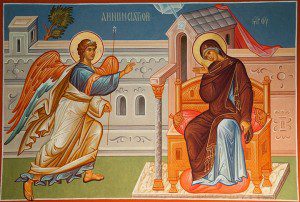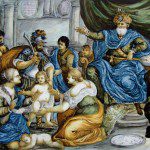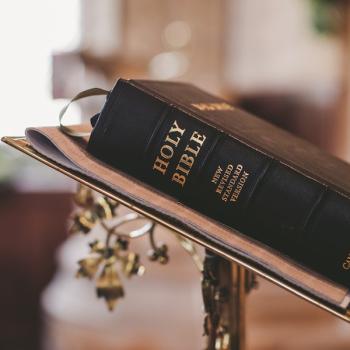
I can’t shake this feeling: Mary said “yes.” She said “yes.” She said, as the Latin Angelus goes, “be it done unto me according to Thy word.”
How mundane! How small is the word “yes.” Yes, how many times a day we bandy it about. And yet, this statement shook the world. The Mother of God can be said to be the Theotokos, the God-bearer, a primary means of our salvation, precisely because she uttered simple words of affirmation, precisely because she had the courage to do the will of God.
This is a historical story; yes, a fact of our soteriological history. But it is also a lesson. Not a lesson in saying “yes” to life—carpe diem, seize the day, etc. Rather, it’s a reminder that we must discern and further we must be willing to face the terror we often find at the bottom of discernment.
God’s will can be frightening. Does a missionary, even if burning with zeal, feel no fear in going to Africa? Did the medieval woman—pregnant—not shutter, even as she “did her duty” in bringing a child into the world? Do we not balk every, single day at the injunction to love our neighbors as ourselves?
The lesson of the “yes” of the Theotokos, like all Biblical history, has more than a merely historical meaning. It has—necessarily has—meaning for each of us, for the every human being created in the image and likeness of God. Indeed, it is so easy to make excuses, to tremble before the terrifying will of the Lord, whether it be in the face of our vocation, our crosses, or, even the mundane enactments of God’s universal commandments (love God, love neighbor, etc.).
But what is there besides the “yes?” There is, of course, the “no” of fear, of running for comfort. Yet even this “no” cannot run forever. Perhaps it even stirs up pangs of regret, reminders that the failure to say “yes,” from the mundane to the history-changing, are significant.
If we push Mary’s story beyond this, we see that affirmation of God’s will can mean suffering, can mean watching your son—crucified—slowly suffocate under the weight of His own ragged body. And yet, what else is there? Death? Fear? Barabbas?
That’s really the simple lesson: that our Lady’s “yes” is not merely a tale, but an archetype, a shining example for all of our lives, a reminder that, as the philosopher George Grant liked to say, “It always matters what each of us does.”
Yes, yes:
Ecce ancilla Domini.
Fiat mihi secundum verbum tuum. Ecce ancilla Domini.
Fiat mihi secundum verbum tuum.













